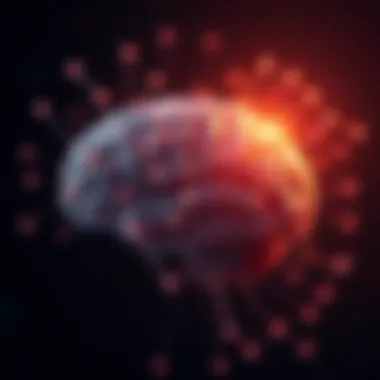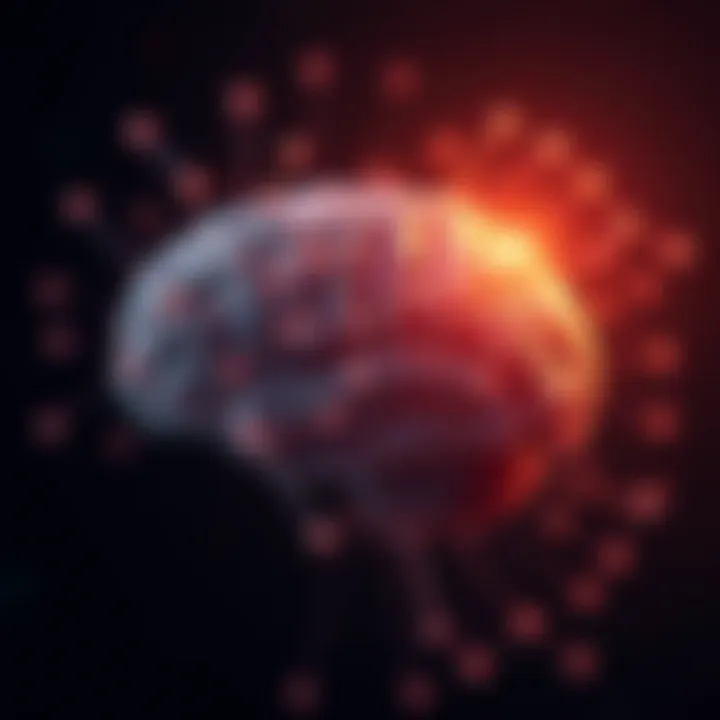Understanding and Managing the Complexities of Depression


Understanding Mental Health and Well-being
When we talk about mental health, it encompasses a wide spectrum that affects how we think, feel, and act. It’s not just about the absence of mental illness, but about having a state in which individuals can realize their potential, cope with normal stresses of life, work productively, and contribute to their communities. Mental health can change over time and is influenced by multiple factors including biological, environmental, and social components.
What is Mental Health?
Mental health is often misunderstood, seen as a niche concern, or something people only associate with severe conditions. Yet, it’s an integral part of overall well-being. Just like physical health, mental health is essential for a balanced life. It involves emotional, psychological, and social well-being.
The Importance of Prioritizing Mental Well-being
Prioritizing mental well-being is not simply a personal choice; it's a necessity. When we neglect this aspect of health, we can face detrimental consequences that ripple through all areas of life, affecting relationships, work performance, and even physical health. Recognizing symptoms like anxiety and stress early on can be pivotal in steering clear of more serious mental disorders.
Common Mental Health Challenges and Disorders
Indeed, there are numerous challenges people can face in regards to mental health:
- Anxiety Disorders: Experiencing excessive fear or worry.
- Depression: Deep and persistent feelings of sadness.
- Bipolar Disorder: Fluctuations in mood that can swing between extremes.
- Obsessive-Compulsive Disorder (OCD): Unwanted repetitive thoughts and behaviors.
These challenges reflect a variety of experiences, but they all share a common theme: they can significantly impact one’s quality of life when left unaddressed.
Strategies for Improving Mental Health
To navigate the complexities of mental well-being, individuals can adopt various strategies tailored to their situations. This involves proactive measures and techniques that place an emphasis on healing and growth.
Self-care Techniques and Practices
Self-care should be at the forefront for anyone seeking to enhance their mental health. The term often gets tossed around, but it can include practical habits such as:
- Engaging in hobbies that bring joy.
- Taking breaks to recharge.
- Staying hydrated and eating well-balanced meals.
Building Resilience and Stress Management
In an unpredictable world, building resilience becomes key for mental health. Cultivating a mindset that can adapt to stress involves a few tricks:
- Practicing problem-solving skills to manage challenges more effectively.
- Recognizing that setbacks are part of growth.
"Resilience is accepting your new reality, even if it's less good than the one you had before."
– Elizabeth Edwards
Seeking Professional Help: Therapy and Counseling
Sometimes, professional guidance is essential. Therapists can provide tools and frameworks to help navigate through tough times. In addition to standard therapy, some people opt for group therapy, which fosters a sense of community among participants who are experiencing similar challenges.
Finding Balance in Life
Achieving a balance requires deliberate choices that often resonate well beyond mere mental health. Integrating positive habits into daily life can create a foundation for stability.
Healthy Lifestyle Choices: Diet, Exercise, and Sleep
What we consume can vastly impact our mental well-being. Keeping a balanced diet, regular physical activity, and prioritizing sleep can make one feel more energetic and less overwhelmed.
Mindfulness and Meditation Practices
Mindfulness and meditation have gained traction over the years as effective practices. They help individuals to ground themselves, manage emotions, and focus on the present. Simple techniques can aid in ushering tranquility into daily routines. Engaging in deep-breathing exercises or meditation apps can be a good start.
Setting Boundaries and Managing Time Effectively
Time management and boundary-setting are not just about productivity; they're also vital for mental peace. Ensuring that there’s time for rest and reflection is crucial. Create schedules that allow for flexibility, reminding yourself that it's okay to say 'no' to commitments that stretch you too thin.
Enhancing Personal Development
Personal growth is linked closely with mental health. Setting goals and achieving them contributes to a sense of fulfillment and can positively impact mental well-being.
Goal Setting and Productivity Tips
Establishing specific, actionable goals can pave the way for change. Whether it's career ambitions or personal projects, writing them down can increase accountability. Breaking larger tasks into smaller, manageable ones can make them seem less daunting.
Building Healthy Relationships and Social Connections
Social interactions play a massive role in mental health. Maintaining healthy relationships requires effort and consistency:
- Make time for friends.
- Share experiences.
- Offer and seek support when needed.
Practicing Gratitude and Positivity
Gratitude can shift perspectives and foster a more positive mindset. Keeping a gratitude journal or simply taking a moment each day to reflect on what one is thankful for can shift focus from struggles to blessings.
Tips for Maintaining Mental Well-being
Mental health is an ongoing journey. Here are practical tips that individuals can incorporate into their routines:
Strategies for Preventing Burnout
It's vital to recognize the warning signs of burnout. Prioritize rest, set realistic expectations, and rotate responsibilities when possible to avoid becoming overwhelmed.
Coping with Challenges and Setbacks
Life throws challenges, and knowing how to cope is crucial. Developing a toolkit of coping strategies—perhaps breathing exercises or talking it out with someone—can be very beneficial when faced with difficulties.
Creating a Supportive Environment
The environment we inhabit can have a profound effect on our mental health. Creating spaces that feel safe and encouraging makes a substantial difference. Surround yourself with supportive people, and don’t hesitate to reach out and ask for help when needed.


As you read this article, remember that your mental health matters, and taking steps toward understanding and managing depression is a courageous and worthwhile endeavor. For further information, resources, and support, consider visiting MentalHealth.gov or engaging with communities on platforms like Reddit.
Understanding the depth of depression and mental health is complex yet rewarding, leading to growth and recovery. Every action taken toward awareness and healing creates ripples that can transform lives.
Defining Depression
Understanding depression is stepping into a labyrinth that reshapes how individuals perceive their mental health. The term ‘depression’ often gets thrown around in casual conversation, sometimes as lightly as discussing the weather. Yet, defining it accurately is crucial for several reasons.
Firstly, the clarity of definition helps dismantle misconceptions. A vague understanding can perpetuate stigma, discouraging those in need from seeking help. Knowing that depression is not merely feeling blue or down in the dumps opens a pathway to recognizing its seriousness. Furthermore, insights gained through a clear definition can guide practical approaches to managing this often-challenging condition, helping individuals and their loved ones identify when professional help is necessary.
Understanding Clinical Depression
Clinical depression isn’t just a phase or a fleeting emotion. It’s a persistent condition that affects mood and daily functioning. This form of depression, formally known as Major Depressive Disorder, encompasses a multitude of symptoms—ranging from deep-seated feelings of sadness to severe fatigue.
The clinical aspect denotes that it’s often diagnosable by health professionals, adhering to specific criteria. For many, understanding this can lead to vital treatment options. It’s a conversation starter around mental health that can lead to deeper discussions about therapies available, as well as lifestyle modifications that can help individuals reclaim agency over their lives.
Distinguishing Types of Depression
Recognizing different types of depression is fundamental to crafting an effective management strategy. This diversity speaks to the complexity of human psychology, illustrating how varied experiences can be. Broadly, depression can be categorized into three main types: Major Depressive Disorder, Persistent Depressive Disorder, and Bipolar Disorder, each with its own set of nuances.
Major Depressive Disorder
Major Depressive Disorder, or MDD, is perhaps the most well-known type of depression. It tends to manifest through a cluster of symptoms that interfere significantly with one’s daily life. Key characteristics include persistent sadness, loss of interest in once-enjoyable activities, and diminished ability to think or concentrate.
The recognition of MDD is essential because it serves as a touchstone for many treatment options, particularly psychotherapeutic methods. Its widespread acknowledgment helps individuals relate to their experiences, knowing they are not alone. A unique feature of MDD is that it can often occur with episodes, meaning one may go through periods of feeling better followed by debilitating bouts of depression. The cyclical nature allows for a variety of coping mechanisms designed to empower individuals during their brighter days, but also emphasizes the importance of structured interventions during more difficult phases.
Persistent Depressive Disorder
Persistent Depressive Disorder, also known as Dysthymia, paints a slightly different picture. Unlike MDD, which can come in episodes, this form is characterized by a chronic state of low-grade depression lasting two years or longer.
The hallmark of Persistent Depressive Disorder is the feeling of a cloud hovering relentlessly overhead. While some may function through their daily routines, they typically do so in a state of diminished pleasure or contentment. This can lead to a gradual weariness of life itself. The steady nature of this condition allows for unique challenges, as its insidious onset might prompt individuals to misinterpret their prolonged sadness as a permanent facet of their identity, hence delaying intervention. Yet, it also equips the afflicted with a certain resilience over time, fostering remarkable coping strategies that can serve as tools for navigating life’s ups and downs.
Bipolar Disorder
Bipolar Disorder brings a unique twist to the understanding of depression. Characterized by shifts between manic highs and deep depressive lows, this condition encompasses a broader spectrum of emotional experiences.
One significant aspect of Bipolar Disorder is its unpredictability. During manic episodes, individuals may feel overwhelmingly energized, creative, or irritable. Conversely, the depressive phases can be debilitating, impacting one’s ability to function normally. Understanding this duality is vital for both individuals and their support systems. The rollercoaster of emotions makes it necessary to develop specialized coping strategies tailored to both the highs and lows. While the challenges of managing Bipolar Disorder can be steep, the awareness of these fluctuations encourages adaptability. It pushes the conversation forward to include balanced discussion about treatment options, emphasizing the importance of a tailored approach supporting overall mental wellness.
Understanding depression in its many forms is about more than diagnosis. It’s also about empathy, support, and the journey toward healing.
For more information about depression, check out resources available at National Institute of Mental Health and American Psychiatric Association.
Symptoms of Depression
Understanding the symptoms of depression is pivotal for acknowledging the condition itself. Many grapple with the notion that feeling down is merely a phase, but recognizing these symptoms allows for a clearer perspective. The signs can serve as a call to action, telling individuals when to seek help and encouraging conversations that may lead to recovery. Knowing the nuances within symptoms not only helps individuals self-identify but also arms their support systems with knowledge to assist effectively. Moreover, understanding these symptoms lays the groundwork for exploring coping strategies later in the discussion.
Emotional Symptoms
Emotional symptoms are often the most apparent indicators of depression. They can reshape an individual’s daily experiences and relationships, impacting everything from work performance to social engagements.
Feelings of Sadness
Feelings of sadness are often the most noticeable aspect of depression. This sensation can evolve from a sense of gloom to a nearly paralyzing emotional weight. Characteristically, sadness extends beyond fleeting moments of unhappiness; it pervades every corner of life. This emotional symptom encourages the reader to grasp how pervasive and deep-rooted such feelings can be, thus offering insight into the isolation many sufferers face. Its unique feature lies in the intensity and duration which can disrupt daily functioning. Acknowledging this can pave the way for empathy from loved ones.
Loss of Interest
The loss of interest is another hallmark of depression. Activities that once sparked joy may lose their luster. It’s a curious phenomenon where enthusiasm dissipates, leaving behind a sense of emptiness. This symptom is often distinguished by its paradox—an individual may wish to engage, but the motivation is swallowed by the thick fog of depression. Notably, this loss can serve as a red flag, prompting individuals to reflect on their mental state. Recognizing this shift invites a broader conversation about mental health and can encourage those around them to reach out in support.
Irritability
Irritability may appear somewhat less obvious at first glance. Yet, it weaves itself deeply into the fabric of depression. An individual’s patience may wear thin, leading to outbursts over seemingly minor irritations. This characteristic is essential for understanding the mixed emotional state often accompanying depression. The challenge with irritability is its tendency to alienate; family and friends may not understand that the unwarranted anger stems from a place of inner turmoil. The nuanced nature of this symptom underscores the complexity of managing depression and highlights the need for awareness and understanding in interpersonal relationships.
Physical Symptoms
Physical symptoms often intertwine with the emotional landscape of depression, frequently manifesting in both obvious and subtle ways. They can profoundly alter everyday life experiences, creating a feedback loop that perpetuates the cycle of depression.
Changes in Sleep Patterns
Changes in sleep patterns often accompany depressive states. Some may find themselves unable to sleep, staring at the ceiling until dawn. Others might experience excessive sleeping, preferring the solace of unconsciousness over tackling the world. This symptom illustrates the strong connection between mental and physical well-being. Sleep serves as a vital restorative process; therefore, disruption can exacerbate feelings of fatigue and emotional instability. Recognizing and addressing these alterations can be an initial step towards improvement.
Altered Appetite
Altered appetite presents another layer of complexity in depression. Some individuals might lose interest in food, while others may resort to comfort eating. This fluctuation often leads to changes in weight and physical appearance. The relationship between emotional distress and eating habits is a critical aspect to understand, as it reflects the intricate interplay between the mind and body. Recognizing this symptom can motivate individuals to seek guidance on healthy coping mechanisms rather than falling into unhealthy patterns.
Fatigue
Fatigue is perhaps the single most unrelenting symptom that individuals with depression face. Unlike regular tiredness, fatigue is like a lead weight dragging individuals down. It’s not uncommon for those suffering to find mundane tasks exhausting, making even simple activities seem daunting. This exhaustion can permeate every aspect of life, leaving individuals feeling as though they are perpetually swimming against a current. Understanding this symptom underscores the necessity of both rest and medical advice; pushing through fatigue often leads to burnout rather than recovery.
Cognitive Symptoms
Cognitive symptoms reveal the darker recesses of depression, affecting thought processes and mental clarity. Identifying these symptoms is crucial, not only for individuals to acknowledge their struggles but also to foster supportive environments where mental health is at the forefront of discussion.
Difficulties in Concentration
Difficulties in concentration can make the simplest tasks feel Herculean. The mind may feel like a cluttered desk, making it hard to sift through thoughts. This symptom is vital as it impacts work and personal relationships. When someone struggles to focus, it can lead to misunderstandings with colleagues or family members, potentially adding further strain to an already delicate situation. Recognizing this symptom is imperative for seeking coping strategies that may include professional help or tailored organizational techniques.
Negative Thinking Patterns
Negative thinking patterns become a lens through which everything is viewed in shades of despair. This cognitive symptom can create a vicious cycle where thoughts spiral downward, manifesting into feelings of hopelessness. Understanding this symptom is essential, as it allows for interventions that cultivate a more positive mindset. Identifying these thought patterns empowers individuals to challenge their own perceptions with the help of therapeutic approaches, paving the way for recovery and resilience.
Feelings of Worthlessness


Feelings of worthlessness often manifest as an overwhelming sense of inadequacy. This can lead individuals to believe they are burdens to others, discouraging them from reaching out for help. The key characteristic of this symptom is its insidious nature; it can creep into the thoughts without clear prompts. Thus, it becomes pivotal to validate these feelings as symptoms—separate from ones' true worth—to encourage individuals to seek support and challenge these thoughts through constructive dialogue and therapy. Recognizing worthlessness as a symptom rather than an identity can foster the vital first steps towards recovery.
Understanding the symptoms of depression provides a foundation for addressing the condition effectively. By categorizing emotional, physical, and cognitive symptoms, individuals and their support systems can better navigate the complexities of depression, encouraging awareness and proactive engagement in treatment.
Causes of Depression
Understanding the causes of depression is crucial in untangling its intricate web. Recognizing what contributes to this illness can help individuals better navigate their experiences and find appropriate strategies for coping. Depression doesn't affect everyone in the same way—it can stem from a mix of biological, psychological, and environmental factors. This section will explore these various causes, offering a clearer picture of the roots of this condition and laying the groundwork for effective management and recovery.
Biological Factors
Genetic Predispositions
Genetic predispositions to depression lie in the DNA, which might create a higher likelihood of someone developing this condition based on family history. Essentially, if a close relative has battled depression, the odds might tilt a bit in favor of the individual experiencing similar struggles. It's not a definitive path but rather an added piece of the puzzle to consider.
Key characteristic: A notable element of genetic predispositions is that they highlight the hereditary aspect of the disease. Understanding this linkage can be comforting. It provides a sense that one isn't alone in facing these challenges, as many families deal with similar issues.
However, there's a double-edged sword here. While recognizing potential genetic factors is beneficial, it can sometimes lead to a feeling of helplessness, as if one were fated to inherit this struggle. The unique feature of genetic predispositions is that they are not deterministic. This suggests that individuals can still exert control over their mental health through lifestyle choices and therapy—a critical cornerstone in managing depression.
Neurotransmitter Imbalances
Neurotransmitter imbalances are another crucial biological element contributing to depression. These chemical messengers in the brain, such as serotonin and dopamine, play a significant role in regulating mood. When their levels are off-kilter, it can lead to feelings of despair and disinterest in activities that once brought joy.
Key characteristic: The significance lies in recognizing that improvements in depression may often be achieved by addressing these imbalances, whether through medication or other therapeutic approaches.
Yet, it's worth noting that this treatment avenue can be a double-edged sword. While medications can alleviate symptoms for some, they might come with side effects or may not work for others, raising concerns about trial and error in treatment. Understanding neurotransmitter imbalances allows for targeted interventions, underlining the notion that biological factors are only one slice of the pie in understanding depression.
Psychological Factors
Cognitive Distortions
Cognitive distortions are faulty, negative thinking patterns that create a skewed perception of reality. Such thought processes contribute to fostering feelings of helplessness and hopelessness, which are common in depression. For example, believing one has failed at everything or is a burden to others can entrench an individual deeper into depressive states.
Key characteristic: These distortions can often spiral out of control if left unchecked, creating a vicious cycle. This aspect illustrates a path—by reshaping these negative thoughts, there’s potential for personal growth and emotional healing.
However, the downside is that cognitive distortions can also reinforce stigma around mental health issues. People may believe they can simply “think their way out” of depression, overlooking the complex interplay of biological and environmental factors. Recognizing cognitive distortions in one’s thinking is vital for effective therapy and recovery from depression.
Trauma and Stress
Trauma and stress are profound psychological factors that can trigger or exacerbate depression. Events such as abuse, loss, or even chronic stress from work or relationships can leave lasting emotional scars. Understanding this connection can be liberating, enabling individuals to acknowledge how past experiences shape their current mental health.
Key characteristic: This awareness can drive individuals to seek healing from the source rather than just addressing symptoms. It fosters resilience and aims for long-term recovery.
Nevertheless, trauma can also lead to a negative reinforced narrative that keeps individuals stuck in their pain. Recognizing trauma as a factor is significant, but so is ensuring there are pathways for healing available as part of recovery strategies.
Environmental Factors
Social Isolation
Social isolation greatly impacts depression, as humans are inherently social creatures. When individuals face prolonged periods without meaningful interaction or support, their mental health can deteriorate. The absence of a support network can leave individuals feeling abandoned and vulnerable.
Key characteristic: Recognizing the role of social isolation can encourage individuals to seek connections and clarity in their lives. Building networks and reaching out during tough times can be priorities in tackling depression.
However, acknowledging social isolation can sometimes lead to feelings of guilt, as individuals may blame themselves for not being more engaged socially. Understanding this dynamic can provide clarity, offering strategies to build connections and address the root causes of loneliness.
Life Events
Life events, whether positive or negative, can have a significant impact on an individual's mental health. Major changes such as moving to a new place, starting a new job, or experiencing a treasured loss can bring a mix of emotions that might lead to depression.
Key characteristic: Life events are unique to each person, making their effects highly personal. Some may find a breeze in change, while others feel overwhelmed, showing the subjective nature of these experiences.
However, understanding the toll of such events can also bring about a sense of urgency for intervention—whether that’s through therapy, community support, or personal reflection. Recognizing these environmental triggers is a fundamental step toward fostering mental well-being, making it easier to prepare for the storm before it arrives.
"While understanding the causes of depression is pivotal, it’s equally important to remember that these elements interact in complex ways. Addressing all facets brings a greater opportunity for healing."
The causes of depression are multi-faceted and intertwined, involving a rich tapestry of biological, psychological, and environmental elements. Uncovering these causes not only aids individuals in understanding their battles but also inspires hope through potential solutions and pathways to recovery.
Impacts of Depression
Understanding the impacts of depression is crucial for grasping how deeply this condition can permeate an individual's life. Depression does not operate in a vacuum; it casts a wide net that affects various aspects of existence. From day-to-day routines to physical health, the ripples of this disorder can be far-reaching. Recognizing these impacts plays a significant role in fostering empathy, improving self-awareness, and, ultimately, guiding effective approaches for coping and healing. It's essential to connect the dots between emotional struggles and how they reverberate through one's life.
On Daily Life
Work Performance
Addressing the specific aspect of work performance is vital when discussing depression's effects. Many folks wake up each morn with high hopes, but that light can dim quickly under the weight of depression. A key characteristic of work performance during depression is erratic productivity. Individuals may find themselves facing mountains of unfinished tasks. Rather than a steady climb towards goals, workdays can feel like trudging through thick mud.
This disarray can stem from challenges such as sharp concentration difficulties and those gloomy thoughts that creep in unexpectedly. The unique feature here is that while some people may attempt to push through, finding themselves exhausted and burnt out, others might withdraw entirely, resulting in missed opportunities for advancement.
Thus, noting this disconnect can be a beneficial choice for our article as it paints a vivid picture of how depression can sullen the work environment, not only for the individual but also for coworkers and overall morale.
Relationships
Moving on to relationships, it’s clear this aspect deserves special attention. Depression can warp interpersonal connections, pulling the individual into a shell. A key characteristic here is that communication can break down. What was once a vibrant dialogue may quickly devolve into silence, misunderstandings, or conflict.
The unique feature of relationships impacted by depression showcases how these changes might lead to isolation. Friends and family members may notice a shift in behavior and wonder what’s amiss, often feeling helpless themselves. It’s not just the depressed individual who suffers; the effects can trickle down and affect the entire network around them. This is a compelling point for our article as it underscores the importance of awareness and understanding in repairing and maintaining relationships amidst such challenges.
On Physical Health
Chronic Illnesses
Now turning to chronic illnesses, the intertwining of physical health and depression is an aspect often overlooked. Particularly crucial here is how depression can exacerbate existing health issues or even contribute to the development of new ones.


For instance, conditions such as diabetes or heart disease may worsen under the shadow of depression, complicating treatment and recovery. This makes it essential to draw attention to the unique interplay between mental and physical health, a mix that requires diligent care. This discussion ignites the importance of a holistic approach in treating those afflicted, as neglect fuels a cycle of suffering that’s hard to break.
Substance Use
Last but not least, the specter of substance use deserves focus within this discussion of impacts. Many individuals grappling with depression may find themselves reaching for substances as a form of self-medication. This is a slippery slope, indeed.
While it might provide a temporary escape, it often leads to more severe problems down the line. A key characteristic of substance use in the context of depression is this irony: what’s intended to elevate mood can lead to deeper lows. This dual-edged situation reveals how reliance on substances can worsen both mental and physical health.
The unique challenge presented by substance use exemplifies the need for comprehensive treatment plans that should address both the underlying mental health issues and any dependencies. Such discussions are fundamental to the progress of understanding and effectively managing the consequences of depression, paving a clearer path toward recovery.
Coping Mechanisms
Coping mechanisms are fundamental in addressing the challenges presented by depression. These strategies serve as tools that not only help in managing symptoms but also foster resilience. Understanding and adopting various coping techniques can significantly improve one's quality of life during difficult times. Given the complexity of depression, it’s essential to explore different dimensions of coping, from therapeutic approaches to lifestyle changes and support systems. All of these aspects contribute to a multifaceted understanding of how individuals can navigate their mental health journey.
Therapeutic Approaches
Cognitive Behavioral Therapy
Cognitive Behavioral Therapy (CBT) stands as a cornerstone among therapeutic methods for depression. This approach focuses on the interconnection between thoughts, feelings, and behaviors. The unique aspect of CBT lies in its structured nature—the therapy is often brief and goal-oriented, making it a practical choice for many seeking relief from symptoms. The key characteristic here is its focus on identifying and altering negative thought patterns.
People often find CBT helpful because it encourages personal empowerment; clients learn skills that can be applied long after therapy concludes. However, one should be aware that it requires effort and commitment, as changing ingrained thought patterns can be challenging. The advantage of CBT is its versatility—it can be adapted to various individuals and integrates well with other treatment modalities.
Mindfulness Practices
Mindfulness practices encompass a range of techniques aimed at fostering present-moment awareness. This can significantly contribute to emotional regulation and reduce the intensity of depressive symptoms. The essence of mindfulness lies in its simplicity yet profound impact—by focusing on the here and now, individuals can cultivate a sense of clarity and peace amidst turmoil. Such practices, including meditation and deep breathing, promote a non-judgmental awareness of thoughts and feelings. This trait makes mindfulness a popular choice among coping mechanisms, as it does not require extensive prior knowledge or expertise. The unique advantage is that it's flexible—one can engage in mindfulness anywhere, whether at home or in a bustling park. Nonetheless, some may find initial challenges in quieting the mind, and perseverance is necessary to reap the full benefits.
Lifestyle Changes
Exercise and Nutrition
Exercise paired with proper nutrition plays a pivotal role in managing depression. Engaging in physical activity releases endorphins—often termed "feel-good hormones"—which can significantly uplift mood and energy levels. A routine that includes moderate exercise can help in reducing feelings of lethargy that often accompany depression.
Nutrition, on the other hand, provides the body with essential nutrients that are crucial for mental health. A well-balanced diet can combat inflammation and improve neurotransmitter function, providing support to the brain during distressing times. Combining exercise with proper nutrition offers a holistic approach to mental well-being, reinforcing the body and mind connection. However, it’s important to note that establishing a routine can be challenging, especially when motivation dips. Small, gradual changes are often more sustainable than drastic lifestyle overhauls.
Sleep Hygiene
Sleep hygiene, which includes habits that promote good quality sleep, is paramount for individuals dealing with depression. A regular sleep schedule, a comfortable sleeping environment, and limiting screen time before bed are all critical factors. Poor sleep can exacerbate depressive symptoms, creating a vicious cycle. The key benefit of ensuring good sleep hygiene is its direct impact on mood and cognitive function.
Individuals may find that by prioritizing sleep, they experience clearer thoughts and improved emotional regulation. Developing a sound routine can take time and effort, but the advantages—such as increased energy and enhanced mood—make it an indispensable coping strategy. It’s essential to recognize the link between sleep and mental health to better manage depression.
Support Systems
Peer Support Groups
Peer support groups provide a communal space for individuals facing similar struggles with depression. The connection built within these groups can significantly lessen feelings of isolation. One standout characteristic of peer support is the inherent understanding that comes from shared experiences.
Members often find solace in knowing they are not alone, exchanging strategies and encouragement. Such groups foster a sense of belonging, which is essential for mental health. However, it's important to consider that not all groups will resonate with every individual, and finding the right fit may take time.
Professional Help
Professional help is often essential in effectively managing depression, offering guidance from trained mental health practitioners. This can include therapy from psychologists, counseling from social workers, or medication prescribed by psychiatrists. A significant advantage of seeking professional assistance lies in the expertise and tailored approaches available.
Professionals can provide insights and strategies that individuals may not have considered. Nevertheless, there's a notable obstacle in the stigma around seeking mental health care. It can deter many from pursuing the help they need. Understanding the benefits of professional guidance and working through these barriers can lead to healthier coping mechanisms and improved outcomes.
When to Seek Help
Understanding when to seek help in relation to depression is crucial. Many people may realize that they have symptoms of depression but hesitate to reach out for various reasons. Recognizing when to speak to a professional can not only lead to effective treatment but can also bring relief and guidance for managing daily challenges. One of the key elements in addressing depression is understanding that it's not something someone needs to battle alone. In fact, seeking help can be one of the first crucial steps toward recovery.
Recognizing the Signs
Identifying the signs of depression can be a daunting task. It's often easier to see changes in others than in oneself. Here are some of the common indications that indicate it might be time to seek professional support:
- Persistent sadness or low mood.
- Changes in appetite or weight.
- Loss of enjoyment in activities once loved.
- Difficulty concentrating or making decisions.
- Withdrawal from friends and family.
Feeling overwhelmed by these signs can create a sense of urgency. The moment someone recognizes such changes, it’s important to consider reaching out for help. It may be more comfortable to talk to someone who can provide an outside perspective.
Barriers to Seeking Help
Despite knowing the signs, many individuals still avoid seeking help. Two significant barriers often stem from internal fears: stigma and fear of judgement.
Stigma
Stigma refers to the societal labels that may lead individuals to feel they shouldn't seek help. This seems to derive from a lack of understanding surrounding mental health issues. Stigma makes people think that admitting to having depression is a sign of weakness, also implying they ought to manage it alone. This misbelief can prevent individuals from recognizing the advantages of professional support. Such stigma can lead to isolation and worsen feelings of depression. What’s notable is that this stigma often accompanies misinformation. The unique feature of stigma is its ability to overshadow the necessity of healing. The real danger here is holding back individuals from getting the assistance they rightly deserve.
Fear of Judgment
Fear of judgment acts almost like a double-edged sword. It's the intense worry about how others perceive one's struggle with depression. This fear can escalate and cause individuals to hide their pain instead of seeking help. Feeling judged can create an unwelcoming atmosphere for openness. It's vital to acknowledge that sharing feelings—no matter how uncomfortable—can open doors to comfort and support. Distinctly, this fear may arise from previous negative experiences or implied reactions from people close to them. This can trap a person in silence, creating an invisible barrier that prevents them from connecting with resources and services that could aid their recovery.
Ultimately, being aware of both stigma and fear of judgment is essential. It takes immense strength to reach out for help, and overcoming these barriers is a critical step toward healing.
Seeking help is not a sign of weakness; it's a courageous step towards regaining control over one's life. Recognizing the signs of depression and the barriers that might prevent action can help individuals prioritize their mental health, ultimately leading them down the path of recovery.
For further resources and guidance on mental health, consider visiting NAMI or Mental Health America.
Resources and Support
Understanding and managing depression requires not just knowledge but also resources and support. This aspect is critical in both navigating the turbulent waters of this mental health condition and finding pathways to recovery. When individuals are aware of the resources available to them, it fosters a sense of hope and agency. Support comes in many forms, whether online or through local services, and can make a substantial difference in how one experiences and addresses their depressive symptoms.
Online Resources
Support Websites
Support websites are a cornerstone of mental health resources. They provide a wealth of information that can help individuals understand their condition better. Key characteristics of many of these platforms include user-friendly interfaces and access to professional advice. Websites like the National Alliance on Mental Illness (NAMI) and MentalHealth.gov offer articles, personal stories, and connections to local services.
Their unique feature is the combination of education and community support, letting users share experiences and find encouragement. A downside can be the overwhelming amount of information available, which might lead to confusion rather than clarity if not navigated properly. However, the convenience and anonymity they provide make them a beneficial choice for many seeking help.
Mobile Apps
Mobile applications have entered the mental health space as a valuable resource, making support easily accessible from the palm of one’s hand. Many apps focus on mood tracking, mindfulness, and providing helpful exercises to combat depressive symptoms. They often come with unique features, such as customizable notifications to encourage positive habits throughout the day. The attractive aspect of mobile apps is their portability and the ability to engage users in self-help practices anytime, anywhere. Yet, the reliance on smartphone technology can lead to a lack of human connection, which is essential in mental health recovery. Balancing app use with personal interactions is vital for effective support.
Local Services
Community Programs
Community programs play a pivotal role in helping individuals combat depression. They often focus on building connections within localities, which can be crucial for those feeling isolated. Many community programs offer support groups, workshops, and therapeutic activities, all aimed at enhancing mental health. A striking feature is the personalized approach these programs often take, so individuals can engage with others who understand their experiences. However, availability can vary widely based on geographical location, and waiting lists may exist in some areas. Nonetheless, the tangible support these programs offer can foster a sense of belonging and community.
Crisis Hotlines
Crisis hotlines are often lifesavers for those in immediate distress. They provide 24/7 support from trained professionals, allowing individuals to reach out without fear of judgment. The most significant characteristic of crisis hotlines is their accessibility; they often can be contacted via calls and texts, ensuring help is just a dial away. While they offer rapid response and immediate emotional support, limitations can include a lack of ongoing assistance and follow-up. They are undeniably beneficial during acute episodes, but users should also seek out longer-term care for sustained recovery.
In essence, resources and support systems serve not only as tools for crisis management but as a guiding light through the murky waters of depression. By harnessing these resources, individuals can construct a more rewardingpath towards understanding and healing.















